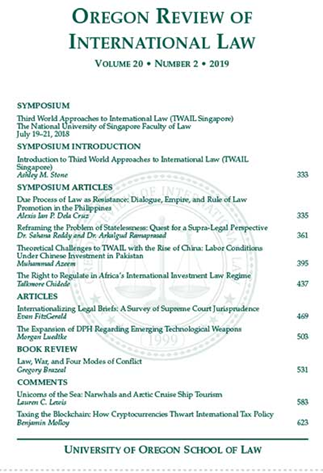Written by: David J Devlaeminck
Edited by: LIU Chun & HUANG Hui
ZHOU Jingyuan (Assistant Researcher) published an article Navigating International Services Trade During Health Emergences: A Scientific Approach to Emergency Measures.

Abstract: After the pandemic, global governance in trade and investment as we knew it is poised to change dramatically. After many governments imposed measures—often unilaterally—in an effort to contain COVID-19, international trade in services plummeted, which, in turn, negatively affected efforts to effectively combat the pandemic. Many measures with trade-restrictive effects appear to have been adopted out of an abundance of caution. Moreover, the unilateral nature of those measures has further impeded international services trade, regardless of the differences in delivery modality. These policies were often adopted without notifying other nations that would likely be negatively affected.
Unfortunately, the primary international services trade instrument, the General Agreement on Trade in Services (GATS), provides little guidance in coping with situations like the current one. The major preferential trade agreements (PTAs) or bilateral investment treaties (BITs) between major trading Members of the World Trade Organization do not provide guidance either. This Article is the first in noting such inadequacies. It first analyzes the importance of services trade. It then identifies several shortcomings of GATS rules for governing health-related emergency measures, particularly Articles III, X, XIV, and XIV bis, and relevant provisions contained in major
PTAs and BITs. It next proposes a new set of rules that seeks to address the dual challenges exposed by this pandemic—procedural challenges (the lack of timely notification) and substantive challenges (standards or factors upon which decisions are based)—without prejudice to domestic regulatory authority while limiting trade disruption in future pandemics. Procedurally, this Article proposes the adoption of a prior notification mechanism under which governments must notify the Council for Trade in Services about specified items. Substantively, this Article proposes to incorporate the “science-based” requirement, similar to that articulated in the Sanitary and Phytosanitary Agreement, and the “proportionate” principle in the GATS. The proposed rules also accord deference to governments’ policy considerations in risk assessment. The Article then draws analogies from the application of the proposed rules to the Sanitary and Phytosanitary Agreement (SPS Agreement) and concludes with the recognition of challenges ahead.
Zhou, J (2022). “Navigating International Services Trade During Health Emergences: A Scientific Approach to Emergency Measures” Oregon Review of International Law 23.